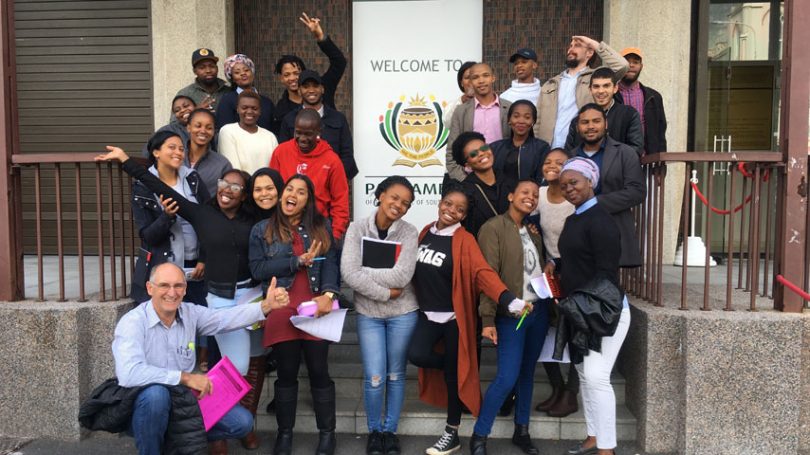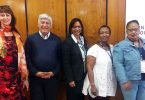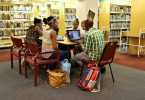Visiting Parliament is a school trip that gets rolled into exploring the Company’s Garden and Iziko Museums for many learners, but it takes on a different meaning for university students.
Recently, Environmental Health students walked down Roeland Street from the District Six Campus to visit Parliament, a trip they looked forward to as a reward earmarked for third year students.
Environmental Health lecturer Michael Agenbag well-remembers that as a student he considered public administration as dull and difficult to comprehend and that dry political issues do not always interest young people.
“Experiencing the environment first-hand where laws are initiated, releases renewed energy and excitement between students and it is as if they become more lively in subsequent classes,” Agenbag explained why he considers this visit important.
As the group of 26 students made their way around the Parliament precinct they were on their best behaviour, refraining from taking selfies in the corridors of power, forewarned by the tour guide to observe the rules.
There were nods of comprehension as the tour guide explained how the two houses of Parliament work and smiles of recognition as the students took seats in the National Assembly’s public gallery.
Demi Darries, 20, pointed out that words like mandate and delegation are often used in class, but this visit changed the way she thought about the concepts.
“It’s nice to hear it used in a real situation. This is something to remember, we’ve seen it for real now,” said Darries.
Agenbag says while students love excursions and it is useful for them to get a bird’s eye view on broader issues, this was actually about giving them perspective on the broader issues.
During his lectures and in-class practical exercises he tries to create “bigger pictures” from international perspectives from among others, the Sustainable Development Goals from the United Nations, our national perspectives as reflected in our National Development Plan, the annual State of the Nation address and municipal planning and how it relates to the issues affecting our communities.
“I then show them how the aforementioned culminates from policies and legislation into operational plans that guide officials’, like Environmental Health Practitioners, daily activities in practice,” said Agenbag.
He finds it useful to confront the students with conditions within the communities that they will have to interact with when they step into the workplace.
“The responsibility of government from the Constitution of SA and subsequent policies are emphasised throughout the year, in order for the students to understand their contribution in achieving these higher level targets, when qualified.
“What I noticed, whilst working in local government for almost 25 years, when Environmental Health Practitioners do not see the bigger picture their routine work makes them despondent because higher authorities, managers and political leaders do not regard the preventative work they are doing. Most of the major developments in Environmental Health, since historical times, followed a crisis,” said Agenbag.
Written by Theresa Smith
#environmental health







